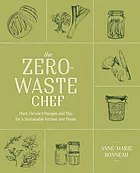by Sharon Koch
I enjoy cooking, find it relaxing to putter about in the kitchen and read cookbooks for pleasure. But let’s get real: food costs are increasing, and we cannot afford to spend limited resources on items we will not reuse or consume. It’s not healthy for our pocketbooks, our bodies, or the planet. But what can we do? My local library provided some answers in an eye-opening cookbook: The Zero-Waste Chef: Plant-Forward Recipes and Tips for a Sustainable Kitchen and Planet.

According to the author, Anne-Marie Bonneau: American consumers generate, on average, 4 ½ pounds of trash per person every day. Much of this waste consists of materials we used briefly, like food packaging, or materials we didn’t use at all, like food.
The way we consume is linear: We take raw materials to make products to dispose of them after their (usually short) life, which generates approximately 268 million tons of waste a year. A little over half of that waste ends up in landfills. As the waste decomposes, it belches methane gas into the atmosphere, a greenhouse gas 84 times more potent than carbon dioxide over a twenty-year period, and excretes toxic leachate into the ground, which contaminates our groundwater.
This book has many helpful ideas for how to make complete use of all the bits and pieces of food scraps from our kitchen and how to store items in sustainable containers, and it also includes recipes for condiments and sauces that add so much to the pleasure of dining but can be budget-breakers.
For example, there is a recipe for Save-Scraps-Save Cash Vegetable Broth which is made from the woody ends of asparagus, carrot ends, corn cobs, cucumber skins, mushroom stems, etc. You get the idea. Instead of throwing these items into your composting can or garbage disposal, freeze them until you get enough to make a broth that can used right away as a base for soups or cooking rice or frozen in an ice cube tray for future use. Or did you know that cider vinegar can be made from apple peels and cores? The book has a recipe for that too.
Are there ways to store and transport food that do not involve plastic? Here are some of the suggestions from The Zero-Waste Chef: Freeze and store foods in your freezer in glass jars. Use wide-mouth jars with flush sides. Need to cover a bowl of leftovers? Put a plate on top. Store half an uneaten melon or an onion half? Place cut-side down on a flat plate. There are alternatives to plastic baggies like cloth napkins or metal sandwich containers for transporting food. Store asparagus, celery, or basil in a jar of water at room temperature. Store green onions in a jar of water in the refrigerator.
We could also consider how our mothers (or grandmothers or great-grandmothers) planned their meals and cooked. My mother was a young housewife in the 1950’s when so many “convenience” foods were introduced. You know, things like frozen tv dinners. My grandmothers planned their meals based on what was available in their freezers, refrigerators, or cupboards and what was in-season at the market. If you asked for their recipe for a special dish, it usually went something like a little of this: a dash of that and a pinch of whatever. The point being that they did not rely on cookbook recipes calling for exotic ingredients but built a repertoire of tasty dishes by experimenting with what was readily available in their kitchens. The Zero-Waste Chef has numerous suggestions for preparing flavorful, healthy meals without spending lots of time or money.
Together we can make a difference by taking small steps to reduce waste in our homes.
The Zero-Waste Chef Plant-Forward Recipes and Tips for a Sustainable Kitchen and Planet by Anne-Marie Bonneau ISBN 9780593188774 Avery an imprint of Penguin Random House LLC. ©2021 by Anne-Marie Bonneau